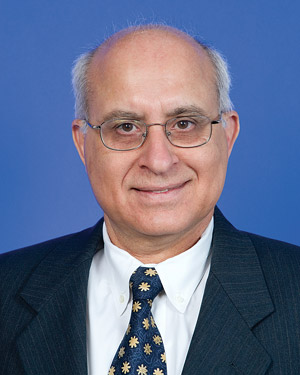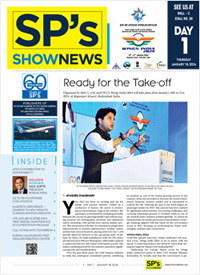- Prime Minister Narendra Modi inaugurates Aero India 2023 in Bengaluru; Releases Commemorative Stamp
- Defence Secretary meets delegations from Saudi Arabia, USA and Oman on the sidelines of Aero India 2023
- Foreign Ministers of 32 countries to attend Aero India 2023
- Embraer showcases the C-390 Millennium at Aero India 2023
India Integral to Honeywell's Global Growth Strategy
Pritam Bhavnani, President, Honeywell Aerospace India
Honeywell Aerospace is the largest manufacturer of aircraft engines and avionics, as well as a producer of auxiliary power units (APUs) and other aviation products. Honeywell Aerospace products and services are used globally on virtually every commercial and business aircraft operating today as well as for defence and space applications. It provides integrated avionics, engines, systems, and service solutions, focusing on the technologies that best meet their needs to make flying safer, more reliable, more efficient and more cost-effective.

SP’s ShowNews (SP’s): Could you give a brief background of Honeywell's association with India?
Pritam Bhavnani (Bhavnani): Honeywell's India experience dates back to the 1930s, when UOP commissioned India's very first oil and gas refinery in Digboi, in the north-eastern state of Assam. Today, India is integral to Honeywell's global growth strategy. All four of its businesses - aerospace, automation and control solutions, performance materials and technologies, and transportation systems - have significant operations in India.
Honeywell Aerospace has been servicing the India aerospace industry for four decades, which includes a long-standing relationship with the Hindustan Aeronautics Limited (HAL) on the local production of the TPE-331 engine. Though this period of investment we have grown our customer portfolio to include some of the largest names in India's defence and aviation industry, including, Air India, IndiGo, GoAir, SpiceJet, Jet Airways, Air Works and Magnum.
Today, we are supplying to, and working with, key stakeholders across all aspects of aerospace at a time when India is going through a period of significant defence and civil aviation investment in response to demand for increased capabilities and from growing passenger numbers. With many of our products designed specifically to support cost-efficient growth of operations, it's a good time for us to be doing business in India.
SP’s: Which activities is Honeywell focusing on currently and what activities would you focus on in the future?
Bhavnani: We are working with the AAI closely, as Air Traffic Management modernisation remains an important area. We have a large portfolio of advanced technologies to help aircraft land easier, faster and operate more efficiently while helping airport operators minimise flight delays and congestion.
Outside of our broad aerospace portfolio, we continue to build on our work in helping to modernise the international airports at Delhi, Hyderabad and Bengaluru with terminal-side and air-side technologies to improve passenger experience from the moment they check-in to picking up their bags at the other end.
And in the defence domain, we are supporting retrofit modifications and upgrades (RMU) requirements for India's military fleets as the country modernises and extends the life of its existing platforms. For example, we are working to install the wide range of existing Honeywell technologies on platforms such as the MiG-21, Do-228, An-32, ALH and IL-76, in addition to already supporting equipment on platforms such as the C-130J, P8I, C-17, Mi-17, An-32, Mirage, LCA, ALH, Cheetah and Chetak in India, through repairs, spares, and software updates.
With future incoming aircraft such as the Pilatus, Chinook, Apache, and Rafale, Honeywell will expand its presence of equipment in India with hightech avionics and modern rugged engines proven in challenging environments such as Afghanistan.
SP’s: Any specific plans for the country in the next five to ten years?
Bhavnani: When you look at our local growth trajectory in recent years -- Honeywell has grown from 1,000 people in 2002 to more than 12,500 employees across facilities in Delhi, Pune, Bengaluru, Hyderabad, Chennai, Gurgaon and Madurai -- you can see the level of importance we are placing on the Indian market. Across the business, we are continuing to grow our own manufacturing and design capabilities in the country. We are also strengthening our local partnership portfolio in the market to further support the country's drive for indigenised design and manufacturing capabilities. The strategy of 'manufacturing in India, by India, for India' is the cornerstone of our long-term plan for this important market, and consequently our local collaborations are pivotal for success.
SP’s: What makes you feel that India is an exciting market?
Bhavnani: The mix of significant industry growth -- the Centre for Asia Pacific Aviation is reporting airport passenger traffic growth to 452 million by 2020-21 -- and some of the world's finest engineering talent make this a great market to be involved in. We not only have enough talent within the Indian market, but we also find many airlines in the Middle East and South East Asia have expatriate Indian engineers and staff. Honeywell Technology Solutions, the technology development and engineering arm for all of Honeywell's businesses globally, has more than 2,800 dedicated aerospace engineers in India working on our latest aerospace products and services across multiple aircraft platforms.
When it comes to cultivating talent, we firmly believe that our responsibility to the aviation and defence industry in India goes beyond just product supply. That's why we have partnerships with numerous universities and schools across the country, in order to foster aviation talent at the grass-roots level. Our Aero Club initiative is a great example of this, as it drives an interest in aerospace engineering and principles of flight at a time when young people are starting to consider their aspirations for the future. It makes sense for us too because with the emphasis we put on doing work locally, ensuring there is a consistent flow of talent coming into the industry is critical to our long-term success.
SP’s: What capabilities do you plan to showcase during Aero India 2013?
Bhavnani: Our focus for Aero India 2013 is centred on technologies and services that can help strengthen local military and aviation capabilities and advance safety, efficiency and operational effectiveness.
We're excited to be showcasing some of the latest products from our engines, navigation systems, connectivity and safety portfolios, across a wide range of military platforms. From the F125IN engine, which provides best-in-class performance and is an option that is designed to extend mission capability of the IAF's Jaguar fleet, to our TALIN inertial navigation system to help troops more accurately navigate in India's numerous remote and GPS-denied areas, our portfolio has been designed to modernise military fleets to maximise mission success and readiness. With safety a top priority in the region, we'll also be showcasing our Health Usage Monitoring System (HUMS) technology, a sensor-based system that proactively measures the health and performance of mission-critical components along a helicopter drivetrain, and our Traffic Collision Avoidance System (TCAS) that improves pilot situational awareness and reduces the risk of in-flight collisions in busy skies. As well as maximising safety, these products also reduce unplanned maintenance costs and increase asset availability.
SP’s: Can you elaborate on your involvement with P-8I progressing for Indian Navy, the IAF's C-130J and the MMRCA programme, as well as HAL's ALH, LUH, HJT??
Bhavnani: As with most military platforms, Honeywell has a range of standardfit technologies on-board these aircrafts, spanning both avionics and mechanical. Honeywell has components on each of the platforms mentioned insuring a steady growth of our presence in India. Because we have the capabilities right here in India, we are well placed to provide maintenance, servicing, logistics and other service and support requirements to keep the aircraft in the best operational condition.
And when the time comes for major upgrades and overhauls, as in the case of Jaguar, we have large-scale technology solutions to help the IAF extend the life cycle of its fleets, improve performance and maximise mission success. Because of the wide range of platforms in service, and being considered by the Indian Air Force, it is very important that we organise and develop long-term support capabilities in India and in conjunction with our long-standing partners such as HAL.





